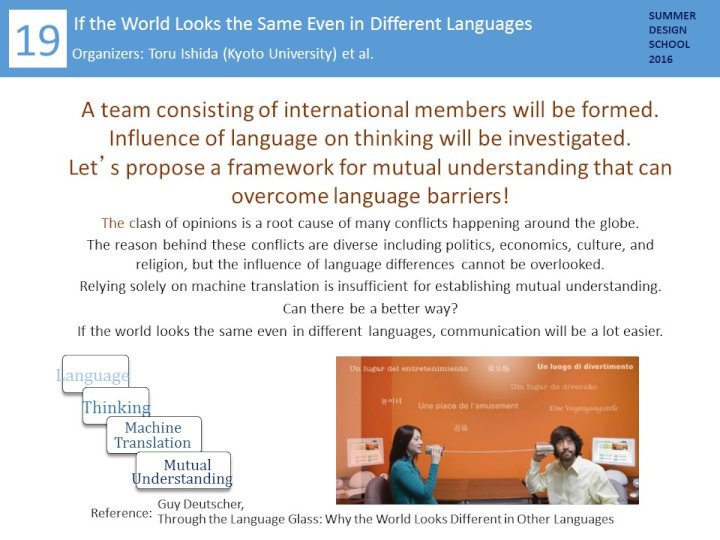We invite participants with diverse cultural backgrounds including Japanese students, foreign students, working adults and so on. We welcome all area of specializations.
| Name | Organization | Specialty |
|---|---|---|
| Ishida Toru | Department of Social Informatics, Kyoto University | Artificial Intelligence, Intercultural Collaboration |
| Cho Heeryon | School of Computer Science, Kookmin University
(South Korea) |
Opinion Mining & Sentiment Analysis, Intercultural Collaboration |
| Pituxcoosuvarn Mondheera | Department of Social Informatics, Kyoto University | Intercultural Collaboration |
| Nakaguchi Takao | Department of Social Informatics, Kyoto University | Service Computing, Intercultural Collaboration |
The clashing of opinions is a root cause of many conflicts occurring around the globe. The reason behind these conflicts are diverse including politics, economics, culture, and religion, but language differences may be one reason for such conflicts due to the difficulty in communication. Take a familiar example of traveling. You may have experienced a puzzling moment when you were visiting a different country. When a foreigner travels to Japan, they may wonder why Japanese people are so quiet. When Japanese people visit overseas, they may hesitate if it is okay to ask for a discount. Such things cannot be figured out simply by asking a question.
The use of online machine translation is gradually spreading, but the machine translation user cannot know for sure whether the translated result is in fact conveying the correct content. Even if the translation is correct, it is not easy to know whether the intent of the message has been conveyed. Moreover, in the case of minority languages spoken by minority populations, there are often no machine translation services available.
If the world looks the same even in different languages, communication will be far easier. In this workshop, we will form a team of international members to investigate the influence of language on thinking (or thought process) to propose a framework for mutual understanding that can overcome language differences.
The title of this workshop is inspired by Guy Deutscher’s book, “Through the Language Glass: Why the World Looks Different in Other Languages.” We will investigate the framework for establishing mutual understanding to overcome language differences by gaining concrete understanding of how language differences can lead to differences in thinking. This investigation will prepare us for the near future when machine translation will be commonplace.
Participants will learn to grasp and understand via diverse point of views the cultures and languages around the globe.
The international team will be constructed from a mixture of Japanese, Korean, and Thai nationals. Throughout the three day workshop, a global mindset is fostered through collaboration and cooperation.
This workshop will guide the participants to learn how to identify the problem and to analyze the cause of the problem. In particular, we will focus on the problem of language difference and misunderstanding.
Various design methodologies will be employed to investigate and propose the solutions for tackling misunderstanding caused by language differences.
Communication modeling is required in order to develop a communication support tool. In particular, the mechanism behind how misunderstanding arises will be modeled with the (theoretical) backing from artificial intelligence and cognitive science.
[Design methods]Brainstorming, forced association, field research, semi-structured interview, prototyping (fine-grained and coarse), and other design methodologies will be implemented.
Mini-Lecture: “Language and Culture”
Related researches including Guy Deutscher’s “Through the Language Glass: Why the World Looks Different in Other Languages” are introduced.
Example cases where misunderstanding occur during translations between parties from different cultures and backgrounds are explored. Incidents of mistranslation and misinterpretations in the past are investigated. This investigation may also include misunderstandings caused by non-linguistic expressions such as facial expression and gesture that accompanies language expression.
Field research is conducted. Workshop participants will collect episodes of misunderstanding caused by linguistic and cultural differences from tourists visiting Kyoto. Participants will go out to popular toursist sites such as Kiyomizuzaka for their fieldwork.
Professional translator/interpretor will share their stories to deepen our understanding on misunderstanding. Through field research and interview, we will model the structure of misinterpretation.
Mini-Lecture: “Language Grid and Multilingual Tool
The ten-year long Language Grid Project led by Kyoto University, and available tools such as Multi-Language Support System for Symposiums are explained and available language tools are described.
http://www.ai.soc.i.kyoto-u.ac.jp/LanguageGrid?lang=en
Discussion with foreign students: A third of the workshop organizer’s research laboratory members are foreign students from U.S., China, Vietnam, Indonesia, Lebanon and so on.
They will join and collaborate with us.
Ideas for building framework and tools for correctly conveying intent despite language differences is examined and formulated.
A selected idea will be prototyped in a hackathon-like fashion. The prototype will be implemented by a super programmer/researcher at Kyoto University.
- Prepare for presentation (KRP)
- Present workshop results (KRP)
